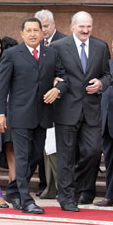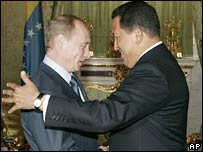Fear and loathing in La Campiña
Quico says: Four years ago, I was working for
VenEconomy out of their Sabana Grande offices. Lucky me, I was living in La Campiña, so I had the rare privilege of being able to walk to work every day. Granted, I did get mugged three times in a year and a half, but at least I didn't have to deal with the traffic.
My “commute” took me right by PDVSA headquarters on Avenida Libertador, twice a day. But this was late 2002 - and, as you'll remember, during the oil strike a group of chavistas decided to camp out more or less permanently in front of PDVSA - a sort of “rojo, rojito” counterpoint to the generals of Plaza Altamira. So twice a day, every day of the week, I had to walk straight through this little throng of militant chavistas just so I could get to the office where I'd spend the rest of my day criticizing them.
Looking very much like the antichavista sifrino I am, this experience was more than a little disconcerting. Pretty soon, I realized I would need some camouflage. Rummaging through the wares the street-vendors at the camp were peddling, I found this bandanna:

Looking at it sideways, I realized I kind of liked it. It dawned on me that this was the only chavista slogan I actually agree with. After all, by December, 2002 - with Globovision playing "Y deciiiiiimos siiiiiii a la esperanzaaaaaa!" on a continuous loop all day long - I was sure the opposition had gone off the deep end. This was a chavista slogan I could make my own!
So for months on end I wore this silly thing on my head on my way to work. There was something appealingly ironic about having to wear it for my own protection. I felt like I was playing a secret joke on the government, like their attempt to impose a new identity on me was as crazy as the ribbon claimed Chavez was making me. I could laugh about it because I was certain that, though they might be able to dictate what I put over my head, they will never control what’s in it.
An identity under siege“Chavez makes them crazy.” When you think about it, it's a really odd slogan. Where else do you find a leader who boasts about undermining the mental health of his opponents? Why is this something to brag about? What does it say about Chavista values that managing to get under our skin is actually a cherished revolutionary achievement? And what is it about Chavez, in the final analysis, that's driving us crazy?
I think Katy came close to answering this the other day when she noted that:
Chávez knows we fear him. That's why his speech is so hateful, so full of incitement. He works to ignite our fear and makes us appear... well, fearful, or to use another word, squalid. It's a show put on for the benefit of poor voters who get a kick out of watching us tremble. It's like their own little French Revolution is playing inside their head; Chávez's tongue playing the part of guillotine.
Part of what's driving us crazy is the realization that Chavez actually gains politically when he baits us - that the more he puts us down, the more his supporters get off on it. Strident divisiveness is not part of Chavez's political strategy - it is his strategy.
There's an element of symbolic warfare at play here. Driving us crazy is important for chavismo because it's part of a strategy to "resignify" the country.
This is a word I’m borrowing from pollster Oscar Schemel, who said:
The current political struggle is chiefly over interpretations and meanings. While the elites and the middle class fight to impose their own notions about democracy and citizenship, the poor majority, chavista and non-chavista, is refuting and resignifying those same ideas. A new culture is emerging, and it's resignifying and deactivating our received ideas about politics, amidst a social and symbolic struggle to redefine democracy, development and social relations.
Regardless of what we may or may not think will happen in December, beyond the polls and predictions and allegations, there are two things I have learned this week. The first is something we can all agree on, that Rosales still has a shot, because the only poll that counts is the one in December 3rd. The second is more controversial, and it’s that most of us would find it incredibly difficult to deal with the possibility that there may be more of “them” than there are of “us.”
The reasons for this go back to Chávez himself. Because Chavez's attempt at re-signification is, in the end, an attempt to redefine our identity, to change who we are.
The attempt isn't subtle. From changing the national coat of arms to adding extra stars to the flag to splashing a partisan tag across our damn passports and cédulas, the revolution has not been bashful in its attempt is to enshrine its ideology, its phraseology and its iconography permanently into the symbolic fabric of our national identity. The goal is to establish chavismo as the ideology of the State and not merely of the government - partly, of course, by erasing the distinction between the two.
Chavismo's symbolic agenda is fundamentally exclusionary - it is
about excluding us, subduing us, about banishing our values, our thoughts and our understanding of what democracy is and how it should work. Its goal is to impose a new symbolic order where the way we think is "un-Venezuelan." What's serious, what drives us crazy, is that Chavismo has launched a bold and ruthless drive to redefine "our" national identity in terms that expressly exclude “us” from it.
Is it any wonder the guy is driving us crazy? Is it any mystery why his supporters are proud of that?
Become the majority right now!My fellow bloggers and I have been getting some very strong, deeply emotional reactions in the last few weeks from committed readers, people we respect and value and spend lots of our time writing for. What is curious is that what sparked this controversy is something that wouldn’t be that controversial in a working democracy: our honest opinion, based on research that may or may not be right, that more people may be planning to vote for one candidate than for another.
What's clear is that, for many in the opposition, the proposition that we might be in the minority is an impossibility; a banned thought, something unsayable, unthinkable - certainly unbloggable.
Why are we so touchy about this? I think Katy's right: deep down, we are dead scared of losing the battle over the meaning of Venezuelan-ness. Our understanding of democracy, which we had always taken as the unchanging center of our national identity may be about to die...and we've convinced ourselves that it will die, if it turns out that we are in the minority at the end.
Suddenly under siege, feeling itself dependent on majority support for its viability, our identity has turned defensive. Paraphrasing,
J.M. Briceño Guerrero, our certainty of being a majority has turned oddly defensive...
it's as though we were speaking rather in the imperative: "be the majority" - layered over an unspoken "it would be unbearable not to be so", all of which rides on the strongly repressed sense that "horror, we aren't!", which only bolsters the imperative: "become the majority right now!" which again turns into the indicative, now supersticious and magical: "we are the majority."
We have fallen into a trap, believing that if there are more of them than there are of us, Chavez's attempt to resignify Venezuelan-ness has succeeded. It’s as though contemplating the possibility that more people want to vote for Chavez than for Rosales is contemplating, symbolically speaking, our own ethnic cleansing - the anhiliation of our identity.
But we’re wrong about this. Who we are, what we are, our right to be dissenters and fully Venezuelan at the same time
can be sustained even if we are in the minority. A new, exclusionary definition of Venezuelan-ness cannot be sustained over the active resistance of just under half the country; it’s just that we act as if it could. Only the belief that this election is a matter of survival leads us to say things like “everything is in play this December.”
Well, everything is not in play. Don’t get me wrong, this is an important election, one that we really, really need to win. But if we don’t, we will continue our struggle. Unless, that is, we lose the battle inside ourselves; we start wearing our bandannas on the insides of our heads.
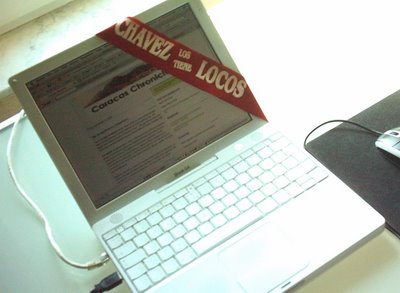
In the end, I got so attached to this little trinket, to this souvenir of my struggle to survive amid the symbolic onslaught, that I brought it with me when I came to Europe. I like to glance at it when JVR starts baiting us for the cameras, when Chavez starts to rant. It reminds me that the more we lose our cool, the more we advance their agenda.
Because when the other side's goal is to make you crazy, the only way to fight back is to stay sane.
Please comment responsibly:
|
"No me ayude tanto, compañero."
Hate Caracas Chronicles lately? Guess what, so does everybody else! After a bloody barrage of abuse aimed at my recent editorial line - the disgruntled readers' version of shock and awe - I thought I'd ask one of my most loyal, crankiest readers to post a kind of Why CC Sucks Greatest Hits. Escualidus Arrechus says: Lately, what used to be a brilliantly insightful blog on Venezuelan politics, has degenerated into a premature funeral procession for Manuel Rosales, the Venezuelan opposition, or both, depending on the mood that takes our fearless leaders. Depending on your degree of participation in the comments section, you may or may not be aware of how pissy this has made everybody. My job, I guess, is to give you the highlights.
Mind you, this isn't an attack on internal criticism within the opposition, or even a call against making such criticisms in public. If the opposition fell into that m. o., we'd be no better than chavismo itself. But there's "self-criticism", and then there's the borderline suicidal ramblings Quico and Katy have been feeding us of late. I don't even entirely disagree with them, and I'm by no means a blinders-on Rosales booster. But the defeatist funk has been steadily increasing over the past few days, and something's gotta give.
As far as I can tell, there're four key talking points in the Caracas Chronicles “Suicide is Painless” prom theme for 2006:
1. “Rosales is fighting a losing battle. The polls say so, and Lord knows they're infallible”. Now, Rosales might very well lose on December 3rd. But the fervor with which Quico clings to the almighty polls is only comparable to, well, the fervor with which some in the opposition reject them. Neither one is particularly rational. Every time a poll is exposed as suspicious or downright rubbish, Quico points to his favorite, most trusted pollsters, whose results match those of the disgraced pollster du jour. Well, Quiquete, does that mean the pollster with the shoddy methodology and/or sampling was actually right, or does it perhaps mean that there's something rotten at the source? The best methodology in the world is useless without quality data, and that's become harder and harder to find in Venezuela lately.
The polls could very well be correct (personally, I think Rosales has a fighting chance, polls be damned), and Chavez could still enjoy the approval of half the population. But I'd rather not lick my wounds before the battle is waged. I want campaign strategy, not eulogies while I'm still alive.
2. “Rosales is doomed because he's surrounded himself with remnants of La Cuarta”. This is personal sour grapes masquerading as political analysis. Quico has a long-documented distaste for the old political class, dismissing it as a single entity, a strategy reminiscent of the one Chavez used to sell the electorate on his constituyente. And it's the trait of his that gets my goat the most. He's taken Chavez's half-assed politics and made them his own. It's almost as though he feels he's a true moderate by conceding the enemy's got a point. No, Quico, it just means you're easily manipulated by leftist guilt.
3. “The Venezuelan private media justifies Chavez's attacks when they shamelessly give extensive coverage to Rosales' rallies”. A lovely sentiment, and one I can agree with to a degree. The private media, and Globovision in particular, can be viciously anti-Chavez, and their open bias could negatively influence swing voters. But to leave it at that is to engage in shallow analysis that brings nothing to the table. In a country where the “public” TV network is a stronghold of government propaganda, where newspapers are hit through the denial of foreign currency for supplies purchases, where TV stations are routinely raided and “investigated”, the conditions for healthy journalism are shot. The Venezuelan media is fighting for its life under this administration, and any analysis that ignores that, is incomplete, and hopelessly naive.
4. “Chavez is authoritarian, sure, but totalitarian? Nah. Drop the hysteria”. Must be nice to live in a country where you can wax poetic about the differences between the terms. Chavez is certainly not a totalitarian hegemon, but not for lack of trying. It may sound like a cheap shot, but I honestly believe their distance from home has erased Quico and Katy's memories of life with a president that regularly calls you the enemy. Los tiros? Ya sabemos por donde van. Don't try to tell me Chavez is “all talk, he'd never go that far”. He has, and will again at the first chance.
I don't want Quico, Katy, or Whatshisface to stop writing. Hell, I don't want them to stop writing critically, at that. But I do want them to stop mourning the living. Prepare to storm the beach, kids, 'cause the fight hasn't even begun. If we lose, I want to lose after running our opponent bloody ragged. I want him to hit the mat right after us. If he beats us, let it be the worst Pyrrhic victory of all time. Throwing in the towel before the fight begins is not an option. Atrevete.
Please comment responsibly:
|
Maracaibo and Rosales hit the big time
 Katy says: There are several reasons I just had to reprint this latest article from The Economist. One, it recognizes the enthusiasm of the Rosales campaign and acknowledges some of the governor's best traits, including his endearing wife. Two, it is realistic about his chances but nevertheless sees this campaign as an important step in regrouping the opposition. And three, it mentions Maracaibo in the title. How cool is that?
Katy says: There are several reasons I just had to reprint this latest article from The Economist. One, it recognizes the enthusiasm of the Rosales campaign and acknowledges some of the governor's best traits, including his endearing wife. Two, it is realistic about his chances but nevertheless sees this campaign as an important step in regrouping the opposition. And three, it mentions Maracaibo in the title. How cool is that?
----------
Venezuela
The Man from Maracaibo
Nov 9th 2006 | CARACAS
From The Economist print edition
At last, the opposition to Hugo Chávez finds a star of its own
JUST a few months ago, Venezuela's opposition was divided, apathetic and nervous. With a presidential election due on December 3rd, Hugo Chávez, who is seeking a fresh six-year term, was flush with petro-dollars and riding high in the opinion polls. The dozens of small political parties and pressure groups that make up the opposition could not even agree on a method for selecting a candidate. Many thought the election was so heavily rigged in Mr Chávez's favour that the only sensible option was to boycott the whole process. A similar ploy in December last year had left the 167-member National Assembly without a single opposition member.
Step forward Manuel Rosales, the governor of the western state of Zulia, whose capital is Maracaibo, the country's second city. He has never lost an election since becoming a local councillor 27 years ago. As a provincial politician with his own power base, he was freer than most rivals to cut through the backroom deal-making, heavily influenced by media bosses, that has blighted opposition politics in recent years. He skilfully outmanoeuvred the abstentionists, securing the candidacy and the support of almost 40 political groups.
Since then he has criss-crossed the country, striding through poor neighbourhoods from the Colombian border to the Orinoco delta, hugging old ladies and kissing babies. On November 4th several hundred thousand supporters accompanied him on a 26km (16 mile) march across Caracas. That was reminiscent of the mass rallies against Mr Chávez between 2002 and 2004. The opposition's troops are in good heart. Even Mr Chávez, used to dictating the political agenda, has been forced partly on to the defensive.
So can the president be defeated? Probably not. Many of the polls are biased to one side or the other. But the best guess is that Mr Chávez retains the support of at least half the electorate, with Mr Rosales probably 20 points behind. Since the president, a former army officer who led a failed coup in 1992, was first elected in 1998 the voters have consistently split about 60:40 in his favour. With abundant oil revenue at his disposal and no budgetary restraints or institutional checks on his power, Mr Chávez is a tough opponent.
But Mr Rosales has landed some punches. Mr Chávez spent much of this year touring the world doling out gifts in a failed bid for a seat at the United Nations Security Council for Venezuela. Rather than the “anti-imperialist” struggle abroad, says Mr Rosales, what needs attention is rampant crime, a housing shortage and persistent unemployment at home. His campaign features a debit card which he says he would use to distribute 20% of oil earnings directly to the poorest members of society. “That's much less than what this government has given to other countries,” he claims.
The card could be a vote-winner. Polls show big majorities against the foreign handouts Mr Chávez uses to gain allies for his crusade against the United States. That, in the view of his opponents, was why Mr Chávez this week snubbed London's mayor, Ken Livingstone, cancelling his planned trip to Caracas at the last minute. The British leftist was to sign a deal that would swap cheap diesel for London buses for advice on crime, waste disposal and the like. Venezuela's foreign minister will now sign the deal in London.
Mr Rosales lacks Mr Chávez's skill as a communicator. But like the president, he comes from a humble background. Unlike him, he is happily married. Several of his ten children are adopted. His wife Eveling is an accomplished campaigner. The government derides him as a typical product of the discredited pre-Chávez era. But he broke with the dominant party of that era in the early 1990s. If he can create a strong enough organisation to hold the opposition together even in defeat, he will have achieved more than its last two presidential candidates. There will be opportunities ahead. With deepening social discontent and falling oil prices, Mr Chávez's “revolution” is likely to run into trouble.
Please comment responsibly:
|
An update on the Chavez reelection blog
Katy says: For those of you who are interested, I've posted some new pictures in
that other blog. Thanks to my super-secret spies, boldly documenting government abuse all over Venezuela. Keep those pictures coming!
Please comment responsibly:
|
Things you learn from watching Globovisión at high altitude
 Katy says:
Katy says: Last weekend, my family and I rented a cabin high in the Andes to get away from it all. What the picture from the brochure didn't show was that the cabin had a satellite dish, so one of the channels on offer was Globovisión.
So much for getting away from it all. I hadn't watched Globo in ages, so I decided to take in their coverage of Saturday's 26x26 walk-a-thon.
The enthusiastic, racially diverse crowd was impressive. Globo's broadcast was not.
For starters, the march got non-stop, wall-to-wall coverage all afternoon. All they did was show the crowds all the time, which is great if you're a Rosales supporter like me. But what's a NiNi to think? That Globovisión is spoon-feeding them their chosen candidate. What a turn-off.
From the studio, Alba Cecilia Mujica kept referring to Rosales, mantra-like, as "the national unity candidate, Manuel Rosales..." with a smile as wide as the Cheshire Cat's. Poor Alba Cecilia, you got the sense that covering this march is the most fun she's had in years. She really should get out more.
And while she's at it, she should try and be just a
tiny bit more professional. I mean, when you use political catch-phrases like "the candidate of national unity," you play right into the hands of chavistas who allege outrageous media bias on the part of private TV stations. What is Globovisión up to? I thought. Is it
that desperate for a whipping? Do they think they do us a favor by being so blatantly pro-Rosales?
I tried to picture a Fox News anchor talking about George Bush as "reformer with results George W. Bush", or "compassionate conservative President George W. Bush..." Not likely...even Fox News shows some restraint when whooping it up for their guy.
Hour after hour, it just kept getting worse.
"Ma'am, what's your name, what do you think of this march?" one reporter kept asking.
"My name is Beatríz, Beatríz Martínez, I walked from La Castellana, and I'm here because I'm happy, because we are finally going to get rid of this totalitarian, authoritarian regime!" Whoa. So much for fear. The only thing missing from her statement was her cédula number and the name of the woman who does her toe nails, but you can probably find that in the Maisanta list under Martínez, Beatríz, La Castellana.
"Sir, what's your name, what do you think of this march?"
A 65-year old man who had obviously walked a lot - God bless him, I can barely make it to the bathroom some days and I'm half his age - answered "My name is Luis Méndez, and I'm happy because this march is the biggest since April 11th!" Oh great, just what we need, more references to April 11th. Keep that up and NiNis will be lining up
en masse on Dec. 3rd...to vote for Chávez!
"Ma'am, what's your name, what do you think of this march?"
"My name is Sofía Pérez, I'm marching from Chacaíto and I'm really happy because the march is very organized." Uh huh. Wait, how much "organization" does a march actually require? It's hundreds of thousands of people walking from one end of the city to the other. Cops just have to stop traffic, street vendors do the rest. Oh well, I guess just making it home alive is a sign that it was a good march. Lots of marchers agreed, "excellent, very well organized." Opposition unity indeed!
A dozen or so of these interviews left me pining for a commercial break. Eventually, it came.
An ad for Rosales, "Atrevete te te", with a woman taking money out of an ATM using Mi Negra. In fact, all the ads I happened to catch were about Mi Negra. Funny how Rosales decided to focus his campaign on
the issue Chávez is least vulnerable on, social policy. Wait, what were Rosales's proposals on crime and jobs, the two issues that all voters care about the most and rate the government's performance worst? Easy to forget...
Then it was back to the march. A shot of a very, very sweaty Rosales with an even sweatier Carlos Ocaríz, making their way through a crowd somewhere in Petare. He tried to give a speech but Globovisión didn't have the sound and their camera was blocked by a string of plastic flags. Amateur hour at the OK Corral...
Oh well. Maybe they'll show some
políticos. Here comes one... it's... it's... it's Antonio Ledezma! Ugh. The man is like a vapid drivel factory. I really can't recall the last time I heard him say anything smart, a fresh thought, a non-cliche. Does he even have a job? How does he support himself? Politicians...
Next up, the ineffable Liliana Hernández, or Ledezma with a wig. A VTV reporter had been asking her tough questions at the beginning of the march, and she was quite rude to him, telling him that "my taxes paid for your salary." Wait, Liliana, isn't that what we want, journalists who ask politicians tough questions? Why so prickly?
I mean, I hate VTV as much as the next gal, but do you have to be so rude, so intolerant, so... chavista? The guy was simply doing his job, the fact that VTV reporters don't do it when questioning chavistas is another issue. Why not take advantage of the opportunity to show that we are different, that
we can handle the tough questions? I thought Rosales did that brilliantly the other day. But that's just beyond her. On second thought, Liliana is Iris Varela with a better hairdo.
More people from the march. The Chairman of the Teacher's Federation (who apparently didn't get the "fear" memo), an old man who kept harping on our poor reporter on the street, telling her that "Rosales was going to save Venezuela for beautiful women like yourself," a poor guajira woman originally from Municipio Mara who was now living in Caracas. And all through, Globo kept up the same tone of breathless, misplaced boosterism. It was kind of sad.
I had to turn it off. The march was impressive, the enthusiasm of the people contagious. But Globovisión is shameful. This march did not merit uninterrupted coverage, and it sure as hell did not merit uninterrupted conter-productive inanity. Instead of asking marchers smart questions, it was like watching somebody else's vacation video. "This is me in El Escorial... this is Juanita at the Eiffel Tower, remember Juanita? That was so funny when you..."
Hours and hours of coverage geared to one type of voter only: the convinced Rosalista who is afraid of losing hope.
Fear itselfWhy this tone? I think the answer comes down to fear. The fear of fear makes us fall into artificial highs, and it makes us lash out at unsuspecting passers-by.
I've been thinking a lot about the reactions to Quico's recent posts, and about the ones I am sure to get to this one, and I've concluded that part of our problem is that we fear Chávez.
When we turn away from people who are saying something we don't want to hear, when we say that we need a kleenex handy to read a discouraging poll, when we build up our hope on the basis of something as hard to gauge as a march, when we accuse people of being chavistas if they express the possibility that the country may, perhaps, actually be about to vote for Chavez, we are simply acting out on fear.
Chávez knows we fear him. That's why his speech is so hateful, so full of incitement. He works to ignite our fear and makes us appear... well, fearful, or to use another word, squalid. It's a show put on for the benefit of poor voters who get a kick out of watching us tremble. It's like their own little French Revolution is playing inside their head; Chávez's tongue playing the part of guillotine.
For all his authoritarianism, his corruption and his incapacity, for all the hate that spews out of his
jeta, I don't fear Chávez. If the country does indeed have a chavista majority, so be it. I don't need my values confirmed by a majority of Venezuelans. I know I'm right to oppose this thug, I know what he's doing is deeply wrong and dangerous, and 6, 8 or 10 million people will not change my mind.
Democracies are like that, sometimes a majority of people make mistakes for the best of reasons. For the best of reasons, a majority of gringos gave the presidency to a bumbling oligophrenic like George W. Bush, and for the best of reasons they just handed the House of Representatives to a dim-witted snob like Nancy Pelosi yesterday. Does that make them right? Probably not.
Me? I'm in this for the long-haul. I'll be working for Rosales from now until the election. But if Chávez wins another term, we'll have other chances, there will be other battles. We have to be careful and watch his every move, but we must remember that he has absolute power now, and if re-elected, he will continue having absolute power. Democracy will continue circling the drain, as Quico says.
I know I will live to see the end of this, and the end will probably not be pretty given how emotionally invested his supporters are in Chavez. I'm not scared of his stupid referendum proposing the end of term limits. Bring it on! It will be that much sweeter when, finally, be it in 2010, 2012 or 2021, we defeat chavismo by defeating the man himself.
Please comment responsibly:
|
Courageous Venezuelans
Katy says: (Note: What follows is a translation of an article Tal Cual published yesterday. Ana Julia Jatar is a brilliant Venezuelan economist, political analyst and fellow blogger. I came to know and admire her back when I was in college, and my career owes more to her than she will probably ever know. Let's hope this book makes waves. It was probably prompted by her own experiences in the unsavory ways of political discrimination, Chávez-style...)------
Ana Julia Jatar undresses chavismo's apartheid
Through the rigorous compilation of documents, photographs, newspaper stories and testimonies, the analyst disentangled the history of the use of the
Maisanta and Tascón lists as instruments of political discrimination.
by Carmen Victoria Méndez
------
If it weren't for political travails, Ana Julia Jatar would probably not exist. That's how former Foreign Minister Simón Alberto Consalvi began his presentation of the book "Apartheid in the 21st Century - Information technology at the service of political discrimination", by the Cuban-born analyst Ana Julia Jatar. Consalvi, who is also a historian and an essayist, was obviously referring to the active role Jatar has played in the current political debate through NGOs like
Súmate, but also to a fact that is more pedestrian than ideological: the author was conceived in Havanna, during the political exile of her father Braulio Jattar Dotti, one of
Acción Democrática's founders.
Several decades later, the same political segregation that made her birth possible moved her to write this book, a documentary investigation of the Venezuelan government's use of the Tascón and Maisanta lists to reward or punish citizens depending on their allegiance to President Hugo Chávez.
For over a year and a half, Jatar compiled documents and testimony that prove "how the Venezuelan State made possible one of the most cherished fantasies of dark characters such as Joseph McCarthy, Adolph Hitler or Benito Mussolini: to have a database with precise information about the political and electoral behavior of each citizen, including their home address, their occupation, their fingerprint and even a detailed register of their shopping habits."
She was assisted in her research by Sumate's Unit against Political Discrimination, and their conclusions were presented yesterday in an act that was more political than editorial. Jatar claims the lists have been used against govenrment workers in at least 45 State entities, but yesterday she chose to let some of the victims of discrimination take the stand and tell their stories.
One by one they appeared:
María Verdeal, a former lawyer for the People's Ombudsman, fired for signing the petition for a recall referendum against President Chávez after 18 years of service to the State; Thaís Peña, Magali Chang and
Rocío San Miguel, former counsel for the National Council for Borders; Ana María Diles, fired from the Ministry of Finance; Jorge Luis Suárez, fired from the National Electoral Council; Yadira Pérez, fired from FOGADE, the Venezuelan institution in charge of handling the banking system's reserve requirements; Trina Zavarce, a former oil worker and member of NGO "Gente del Petróleo"...
But the most dramatic moment came when a current government worker, his face hidden by a ski mask, stepped forward to talk about the pressures he suffers for "belonging to the counter-revolution."
Jatar stated that "his fear is perfectly explained, because discrimination and fear are now a systematic policy of the State. It begins with the lists, but it goes beyond that. He can't even say what entity he works for, because the lists were not buried - they were planted, fertilized and watered in the ministries and other State entities."
According to the author, the most difficult thing was getting people to talk, "because a lot of people are afraid. However, little by little they began opening up. I think this helped people, it gave them courage, they felt they were represented, accompanied and they recovered a little bit of their hope."
The book, which follows rigorous methodological guidelines, was designed by Shimmy Azuaje and was illustrated by Weil. It provides an historic compilation "that has to reach both common folks and international organisms, so that they run out of excuses for Chávez once and for all."
"And this December 3rd, people should transform their fear into a liberating force," she added.
Please comment responsibly:
|
No surprise at all...
Quico says: I guess the part I found most interesting about
that Evans/McDonough poll was not so much the horse-race questions as the mood-of-the-electorate questions - the ones aimed at measuring the structural, socio-economic conditions against which the campaign takes place.
Start off with that old pollster-favorite: "is the country on the right track or the wrong track?" (here Venezuelanized into "is the country on the right path or going off a cliff?")
Upsetting though we may find it, more people think the country is on the right track now than 2 years ago, and more think the country is on the right track than going off a cliff:

The reason is not hard to figure out: incomes for Sectors D and E have been rising far faster than inflation since 2004, as even that hardcore antichavista (but intellectually honest) magazine
VenEconomy acknowledges. So people
are better off, and, more relevantly, they
feel better off:

More relevantly still, most people expect to be even better off in the future...

...all of which translates into positive adjectives when people describe how they feel about the country's situation...

No surprises here: I'm sure if you'd asked these questions in 1974 or 1979, after the first and second oil booms, you would've gotten similar responses. And I'm sure if you asked them today in Sudan, or Russia, or Kazakhstan or any other petrostate, you'd hear a broadly similar story.
After all, there's nothing specifically Venezuelan about the situation we're in: oil gets sold, dollars come in, money flows through the economy, most people see some benefit, and so they're satisfied...maybe not ecstatic, imaginably not particularly enthusiastic, but at any rate satisfied.
Numbers like these certainly blunt the appeal of any pitch for a change in leadership. For sure we are very far away from the situation in 1998, when oil was selling for $10/barrel, incomes dropping, and a mass of very angry people ready to vote for the most radical departure from the
status quo on offer. The kind of pocketbook-led, broad-based arrechera that fuels demand for new leaders is just not there.
None of this is Manuel Rosales's fault, and very little of it can be credited to Chavez. But those are the structural facts, the socio-economic backdrop the campaign is taking place against.
All the passion in the anti-Chavez campaign comes from people like us: middle class, educated, class A/B people worked up over ideological, abstract issues. Which is not to say those issues aren't real, and important, but to point out that we're 15% of the electorate and the stuff that keeps us up at night
no sube cerro.Just about any challenger in just about any petrostate would have a hard time making headway in this context. So it really shouldn't come as a surprise that a not-very-charismatic candidate running against a broadly well-liked leader should have trouble broadening his appeal beyond his base constituency.
I realize there's enormous resistance out there to this message. But striking out on our own and believing what we want to believe has done the anti-Chavez movement terrible damage in the past. It's better to face up early on...these realities don't stop being real just because we don't like them...
Please comment responsibly:
|
Para sacar un pañuelito...
Quico says: Well, a new Evans/McDonough poll is out. They talked to 2000 people at home, in 20 states, between Oct. 26th and Nov. 3rd. It's not pretty...
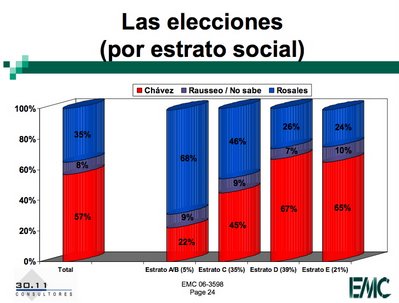
EMC gets top marks for transparency: in contrast with so many other pollsters, they're publishing
their complete results from the start, with exact question-wording and everything. No cross-tabs, though.
Please comment responsibly:
|
26 X 26: Brilliant!
 JayDee says:
JayDee says: First off, sorry for the delay. I'll tell you, though: Saturday's march was impressive. I say this having been thoroughly underwhelmed by last month's "Avalanche", as well as the official presentation of the Rosales platform: "26 KM's for 26 million" was brilliant.
The march had a nice populist touch to it, with Rosales working his way through the streets of Caracas, shaking hands with anyone who walked up to him. There were moments when the crowd crashed in on him, with everyone vying to touch the man or shout a word of encouragement into his ear.
Still, from what I could see, Rosales never lost his cool, and looked genuinely comfortable.
It was a festive affair, and the people I talked to were happy, wearing wide smiles that suggested faith in the righteousness of their cause, and a belief that the country is on the verge of change for the better.
It stood in direct contrast to, say, last month's presentation at the EuroBuilding, which had musicians-on-the-deck-of-the-titanic feel to it.
Not Saturday, though.
What surprised me most was the relative passivity of the Chavez supporters who decorated the sidewalks near the City center. The mass of Policia Metropolitana placed at strategic locations seemed there for decoration. Sure, there were a few Chavistas who flashed the finger, screaming obscenities as we passed. But most of the folk in red stood by the side of the road, clutching pictures of their leader, smilling and dancing to the reggeaton blasting from truck-mounted speakers. I even saw a few opposition marchers stop for a friendly chat with a Chavista and hand out a bit of campaign literature.
The show was a startling reminder to those who would claim that Venezuela, at this moment, has become an Authoritarian or Totalitarian state.
What I liked best about the march was the implicit contradiction it drew between the challenger and the incumbent. Chavez has been leading a sheltered existence these days. Not that it seems to be making much of a difference, but the incumbent hasn't been waging a very impressive campaign.
He spent all summer overseas, campaigning for a Security Council seat that he didn't win. Since returning, his speeches have been mostly devoid of his trademark charisma and filled instead with abstractions about fighting the Devil and his Evil Empire.
Yesterday, Rosales was out there, on the street. Yes, he had a good deal of protection around him, but still, anyone who wanted to get close to him could.
This is the sort of campaign stunt that has the chance to cut into Chavez's base.
Why?
My reasoning is tied up with what I have learned from people such as, yes,
José. Some would criticize him for being "facilista" - too lazy to inform himself and vote for change. To label Jose in such a way, however, is to fail to see the state of this country from his perspective.
Jose is a working class man from the barrio. He votes defensively: not to see things get better, but to keep them from getting worse. Above all, the man wants to avoid a repeat of 2002-2004, of 1992, of 1989.
Now, some might rightly protest that if Chavez wins on 3D, this country has a whole lot worse in store a few years down the road. But most Venezuelans from the barrios don't worry about a few years from now. They worry about tomorrow.
And for someone who lives and works in a Chavista neighborhood where looting and unwanted police attention are a real worry, keeping El Presidente in power is the best way to insure that your bodega doesn't get burned to the ground on December 4th.
What is the solution, then?
More days like Saturday. More live, grassroots attempts to show that there is an alternative, and it just shook your hand.
Please comment responsibly:
|
Dept. of why-didn't-you-make-that-clear-from-the-get-go?
Quico says: According to
El Universal: Keller says he was misunderstood when he explained that the size of Chavez's market is 52% while Rosales's is 48%: "I wasn't referring to voting intentions, but to political segmentation." He believes that such underlying market conditions, basically half-and-half, "lays out a basic situation where anyone could win."
Please comment responsibly:
|

 In the end, I got so attached to this little trinket, to this souvenir of my struggle to survive amid the symbolic onslaught, that I brought it with me when I came to Europe. I like to glance at it when JVR starts baiting us for the cameras, when Chavez starts to rant. It reminds me that the more we lose our cool, the more we advance their agenda.
In the end, I got so attached to this little trinket, to this souvenir of my struggle to survive amid the symbolic onslaught, that I brought it with me when I came to Europe. I like to glance at it when JVR starts baiting us for the cameras, when Chavez starts to rant. It reminds me that the more we lose our cool, the more we advance their agenda.








 Chavez Reelection Blog: Katy documents the government's use of public resources for Chavez's partisan advantage.
Chavez Reelection Blog: Katy documents the government's use of public resources for Chavez's partisan advantage.

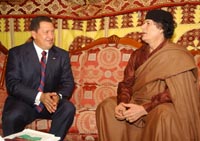
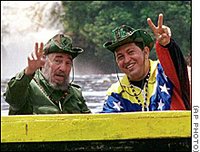
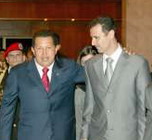
 Site feed
Site feed 